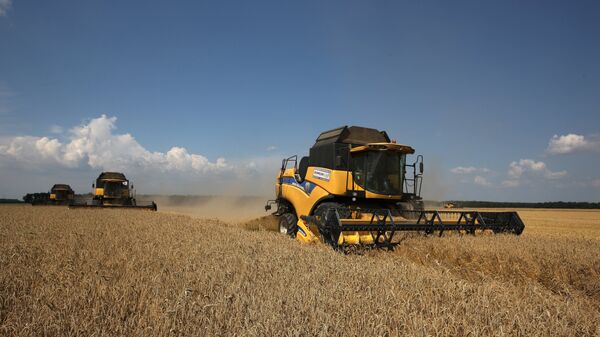“Russia has made a significant progress in the agriculture sector and has become an important player on global agricultural markets. It is poised to become the biggest wheat exporter in the world in 2016/17. Further, our understanding is that Russia’s total cereal production in 2016 is forecast to reach record levels,” Graziano da Silva told RIA Novosti.
Graziano da Silva said that Russia was one of the most important partners of FAO significantly contributing to global nutrition security.
“The [Russian-FAO] cooperation revolves around knowledge exchange and provision of technical assistance to developing countries in ensuring food security and food safety, nutrition, tackling transboundary animal and plant diseases. FAO is also very much interested in attracting Russian expertise in its forestry, fisheries, land and water management and soil programmes,” he said.
The FAO director-general said that Russia had provided $6 million to FAO so that it would implement a food and nutrition security project in Armenia, Kyrgyzstan and Tajikistan. According to him, Russia is also interested in allocating money for an FAO project for the progressive control of foot-and-mouth disease in the same region.
“In 2015, during my official visit to the Russian Federation, we signed a USD 1 million cooperation agreement to support the Global Soil Partnership,” Graziano da Silva said.
He also expressed his hope that FAO and Russia would boost cooperation to support FAO work in post-disaster and emergency situations across the globe.
The international community has capabilities to cope with an ambitious goal of hunger eradication by 2030, the director-general of the UN Food and Agriculture Organization of the United Nations said.
"We are not talking about simply halving the prevalence of hunger or reducing the absolute numbers of hungry people – we’re talking about really ending hunger by 2030, and providing healthy, sustainable diets to all. This is a bold goal, but we are convinced it is indeed viable and affordable. We can and we must be the Zero Hunger generation," Jose Graziano da Silva told RIA Novosti, speaking about the commitment to eradicate hunger included in the UN 2030 Agenda for Sustainable Development.
He added that the struggle against hunger was requiring multiple efforts in many spheres.
The United Nations’ 17 sustainable development goals, including elimination of hunger and poverty, as well ensuring quality education, are part of the 2030 Agenda for Sustainable Development adopted by the UN General Assembly on September 25, 2015.
The instability and various conflicts around the world have a negative impact on the issue of global food security, as well as social protection capabilities, the director-general of the UN Food and Agriculture Organization of the United Nations said.
"Conflict is one of the main — if not the main — driver of food insecurity and malnutrition. It reduces food availability, disrupts access to food and health care, interrupts food production and agriculture, and undermines social protection systems. Indeed, every famine in the modern era has been characterized by conflict," Jose Graziano da Silva told RIA Novosti.
Graziano da Silva stressed that some 80 percent of humanitarian funding appeals were related to conflicts, adding that over 56 million of people across protracted crises were in the emergency level of food insecurity.
According to the official, the FAO has exerted efforts to promote stability and food security in the conflict-ridden countries, such as Nigeria affected by the Boko Haram insurgency.



